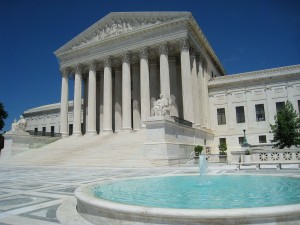Why Pick Federal Appeal Lawyers: Proven Strategies for Successful Appeals
Why Pick Federal Appeal Lawyers: Proven Strategies for Successful Appeals
Blog Article
Debunking the Refine of Federal Appeals: What You Need to Know
Navigating the elaborate realm of government charms can usually feel like going across uncharted waters for those not familiar with the procedure. Comprehending the subtleties of appellate court jurisdiction, the ins and outs of submitting a notice of charm, presenting an engaging short, and making a persuasive oral debate are important parts that can considerably affect the outcome of an instance. By unraveling the layers of intricacy surrounding government charms, people can acquire a clearer insight into the devices that control this critical point of the legal system.
Recognizing Federal Appeals Process
Digging right into the elaborate world of the government appeals process reveals a organized and methodical trip via the judicial system. Federal allures act as an important mechanism for assessing decisions made by lower courts. Comprehending this process is vital for any individual associated with lawful procedures at the federal level.
The procedure typically begins with a party dissatisfied with a reduced court's ruling filing a notification of charm. This activates an evaluation by a higher court, where a panel of courts analyzes the legal debates offered by both celebrations. Briefs describing the legal thinking behind each celebration's setting are sent, and oral disagreements might be heard to clear up complicated concerns.
The appellate court's decision is based upon an extensive exam of the lower court's proceedings and the disagreements offered. The courts do not concentrate but review facts on whether lawful errors occurred that influenced the lower court's decision. Once the appellate court reaches a decision, it can affirm, reverse, remand, or change the reduced court's judgment, offering clarity and finality to the lawful conflict. Recognizing this procedure is crucial for browsing the complexities of federal allures effectively.
Appellate Court Jurisdiction Explained
Appellate court jurisdiction refers to the extent of situations that a certain appellate court has the power to evaluate and determine upon. Unlike trial courts that listen to cases for the initial time, appellate courts are limited to examining choices made by lower courts.
Appellate courts have territory over specific sorts of instances, usually those entailing legal mistakes, step-by-step issues, or concerns of regulation rather than accurate disagreements. The jurisdiction of appellate courts is normally laid out in statutes and legislations that control the court system. Comprehending appellate court territory is essential for celebrations entailed in the appeals process as it figures out whether an instance is qualified for review and the degree to which the appellate court can interfere in the reduced court's choice.
Declaring a Notice of Appeal
The preliminary action in starting the government allures process involves filing a Notice of Charm with the proper appellate court. This critical record formally notifies the court and the other parties associated with the case that the appealing party intends to seek a review of the lower court's decision. Filing a Notice of Appeal is a strict procedural requirement that establishes the appellate procedure in activity.
When preparing the Notification of Allure, it is vital to ensure conformity with the details regulations and standards of the pertinent appellate court. federal appeal attorneys. The file must generally include details such as the instance name, the reduced court's name, the date of the judgment being appealed, and a concise declaration showing the premises for the charm

Instruction and Oral Disagreement
In the appellate procedure, presenting composed briefs and involving in oral disagreements play pivotal functions in supporting for the appealing party's setting prior to the appellate court. Briefs are comprehensive legal papers that outline the celebrations' debates, lawful authorities, and analysis supporting their settings. These created submissions offer the court with a thorough understanding of the facts of the case, the appropriate regulation, and why the appealing event believes the lower court's decision must be rescinded.
Following the submission and evaluation of the briefs, oral disagreements supply the events an opportunity to further clarify their settings, attend to any kind of inquiries the appellate courts might have, and highlight bottom lines from their written briefs. Oral disagreements are a possibility for the lawyers to convince the courts with spoken campaigning for and actions to questions from the bench.
Both the composed briefs and dental disagreements are vital parts of the appellate procedure, permitting celebrations to provide their situation completely and compellingly before the appellate court. - federal crime lawyer
Getting the Appellate Court Decision
The appellate court's decision is normally delivered in a composed layout and outlines the court's final thoughts on the lawful issues provided, the thinking behind their choice, and the judgment rendered. The time framework for obtaining the appellate court's decision can vary, yet courts strive to offer prompt resolutions. Whether the appellate court attests, reverses, or remands the lower court's decision, comprehending the effects of the ruling is important for all events entailed in visit site the appellate process.
Conclusion
Comprehending the appellate court jurisdiction, filing a notice of appeal, preparing briefs, and presenting oral debates are all essential parts of this procedure. Inevitably, getting the appellate court choice can offer clearness and resolution to legal disputes.
As we proceed from recognizing the government allures procedure to exploring the complexities of appellate court jurisdiction, a basic facet comes to light relating to the authority and limitations of these higher courts in the legal landscape. Appellate court territory refers to the range of cases that a particular appellate court has the power to assess and determine upon. Unlike trial courts that listen to situations for the first time, appellate courts are restricted to assessing choices made by lower courts. Recognizing appellate court territory is important for parties entailed in the charms process as it figures out whether a situation is qualified for evaluation and the extent to which the appellate court can interfere in the lower court's choice.

Report this page